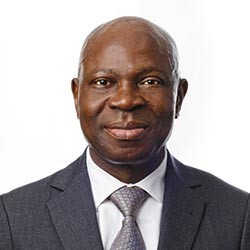World Food Day 2021 - Statement by Gilbert F. Houngbo, IFAD President
IFAD Asset Request Portlet
Asset Publisher
World Food Day 2021 - Statement by Gilbert F. Houngbo, IFAD President
15 October 2021Our actions are our future. Better Production, Better Nutrition, a Better Environment and a Better Life.
Last month’s Food Systems Summit was an opportunity for us all to come together and agree on the actions needed to transform our food systems.
Their inability to provide healthy diets for all is unacceptable, as is the fact that one in ten people around the world are affected by hunger.
Today, I would like to focus my remarks on some follow-up actions coming out of the Summit to make food systems more inclusive, sustainable, and fair.
In particular, we need investments that create opportunities for -- and build the resilience of -- the most vulnerable people working in our food systems. This will be the cornerstone for IFAD’s support of the national pathways that have emerged from the Summit.
Our starting point must be small-scale farmers. We know that small farms are highly productive and contribute more to the richness and diversity of nutrition.
During the height of the COVID crisis when borders were closed, it was local producers who ensured their communities and neighbouring areas had a sufficient supply of food.
As we follow-up on the Food Systems Summit, we need broad-based partnerships that ensure small-scale farmers are fairly rewarded for their labour. Major priorities are pricing systems that reflect the full and true cost of production, and deploying more finance to neglected and vulnerable rural communities.
These issues are central to the FSS action area to “Advance equitable livelihoods, decent work and empowered communities”. IFAD will co-lead the work around the Decent Work and Living Incomes coalition, with a focus - on improving opportunities, incomes and working conditions within food systems to achieve this.
Success also depends on leveraging the investment required to finance food systems transformations.
In that area, IFAD is working on initiatives that bring together public and private actors and other IFIs to support rural transformation.
And at the upcoming COP26 meeting in Glasgow, we will emphasize the need to listen to the voices of small-scale producers and rural communities. We will be asking all actors to ensure that the finance required to support small-scale farmers to adapt and build their resilience to climate change is prioritized.
We look forward to working together to implement the outcomes of the Food Systems Summit and this should start with Members States’ strong interest and commitment to the cause.
This will also not only mean ensuring that the coalitions IFAD is leading have strong impacts on the ground, but also continuing, working with the United Nations Country Teams (UNCTs), to support governments in advancing their national pathways. And it will mean building links with IFAD’s operational activities through our country strategic opportunities programmes (COSOPs), projects and the programme of work as we have already started doing.
Working together –- reporting progress through the follow-up mechanism jointly hosted by the RBAs and other UN colleagues – IFAD is committed to the success of the follow up actions. I know we can harness the momentum generated by the Summit, and ensure that our efforts help achieve the 2030 Sustainable Development Agenda.
This is the moment to re-commit ourselves to joint action. We will be judged not by numbers of new initiatives but by whether our efforts ensure that the world’s poorest and most marginalized people are not left behind.
Let us work together to make sure that our actions speak even louder than our words.
Not checked against delivery
